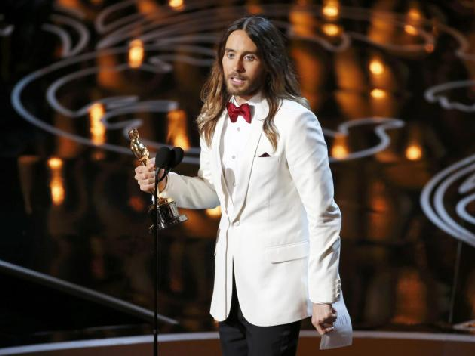Sunday at the Academy Awards, an actor who once delivered a riveting performance for Oliver Stone condemned the director’s most beloved Latin American regime. By condemning Venezuelan socialism, Jared Leto broke Old Hollywood’s leftist rigidity and signaled a sea change within a new crop of diverse, Millennial actors.
For days before the Academy Awards, activists opposed to the socialist oppression in Venezuela began to tweet at prominent actors believed to be attending the Academy Awards, asking for awareness at the ceremony. Latin American celebrities had their opportunity to speak out against the Maduro regime several weeks ago at the Latin Music Premios Lo Nuesto, and did so in droves.
It is safe to say that few expected anyone at the Academy Awards to do the same, especially given that the heavily Cuban-American Miami population of the Premios Lo Nuestro had much to do with that outpouring of condemnation of totalitarianism.
Activists attempted to get the attention of stars at the ceremony, anyway. And, in one instance, it worked.
A billion people will watch the Oscars, they need 2 know about whatis happening in Venezuela @LeoDiCaprio #SOSVenezuela #OscarsForVenezuela
— Ramón Castro (@ramoncastro77) March 2, 2014
Venezuela needs your voice! Please help us in the Oscars to let the world know we need help!! @JonahHill #SOSVenezuela #OscarsForVenezuela
— Valen Perez (@Valenpm) March 2, 2014
Many people will watch the Oscars, Please, they need to know about oppression here @JaredLeto #SOSVenezuela #OscarsForVenezuela
— Antonio Martínez B. (@ALMB4Life) March 2, 2014
Leto’s speech was short, but it encouraged those in Ukraine and Venezuela to keep dreaming, and dedicated the award itself to those who have suffered for who they are:
The nod to Ukraine is almost expected; tensions in Europe and the Middle East rarely go ignored as often as crises in Latin America or Africa. The nod to Venezuela isn’t– especially because Leto wasn’t the only one to acknowledge the turmoil there and speak up on the part of those fighting against socialism. Kevin Spacey tweeted shortly before the Oscars in solidarity with the student movement, as did Forest Whitaker.
Student protesters and opposition leaders alike thanked Leto, Spacey, and Whitaker for the support, while others mocked them for a lack of self-awareness, claiming a shout-out from a celebrity would do nothing to quell the violence. Such an attitude is sometimes appropriate; in the case of Venezuela, it’s not. Maduro’s hands are tied because the international community is watching him, and opposition leader Leopoldo López was betting on people like Leto and Spacey to make it impossible for Maduro to kill him without an international uproar.
The Venezuela moment was not just an important one for Venezuelan protesters, but a milestone in an increasingly rapid cultural change within Hollywood. A critical mass of actors supporting protesters against a leftist regime would not have happened at the Oscars ten years ago. Ten years ago, Fahrenheit 9/11 won the Palme d’Or at Cannes. Leto, particularly– by speaking in person before a Hollywood audience– broke an old rule in Hollywood by condemning a socialist repressive dictatorship with his few words, and heralded in a sea change as Young Hollywood begins to turn on its Boomer ancestors.
Leto is a newcomer to the Oscar throne, inducted Sunday night along with actors Old Hollywood long thought to be jokes, like Matthew McConaughey, and completely new faces like Best Actress winner Lupita Nyong’o. That the Hollywood of 2014 is more diverse– both in experience and background– than many we have seen for decades and that some actors felt comfortable expressing support for the Venezuelan student movement are not mutually exclusive phenomena. A Hollywood that embraces different viewpoints and backgrounds is a far cry from the glamorous old Hollywood that served as the Kennedys’ playground, the cabal of artists that went before the House Committee on Unamerican Activities, or even the more recent Hollywood so proud of themselves for decrying the so-called “abuses” of President George W. Bush.
It is a Hollywood, instead, that takes its own self-righteousness about its political place in the world seriously. It is the sort of Hollywood where Bono is welcomed even after praising George W. Bush–a post-Obama Hollywood where the beloved Democrat’s abuses with drone strikes and internet spying are just as fair game as tinpot dictator Nicolás Maduro’s raping and pillaging of his own people as they scramble to find the last roll of toilet paper in their local supermarket. As the elder statesmen of filmmaking begin to pass into death or infamy, so does their ideology– and Leto’s pronouncement, beyond being meaningful for the greater international community, signals that it is finally okay to oppose socialism on the Left Coast.

COMMENTS
Please let us know if you're having issues with commenting.